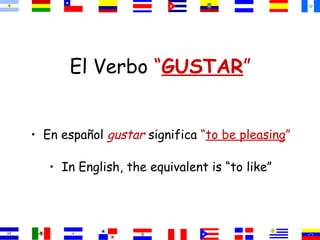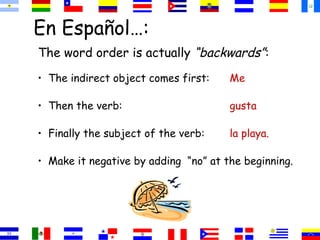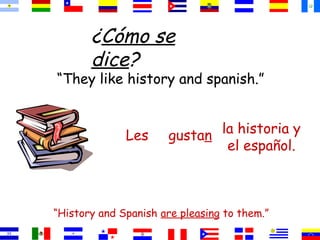Module 3 gustar notes
- 1. El Verbo “GUSTAR” • En español gustar significa “to be pleasing” • In English, the equivalent is “to like”
- 2. Por ejemplo: • In English we say: “I like Spanish.” • En español decimos: “To me, Spanish is pleasing.”
- 3. I like the beach. beach In English: En español: • “I” is the subject • “the beach” is the subject • “like” is the verb • “to please” is the • “the beach” is the verb direct object • “me” is the indirect object
- 4. En Español…: The word order is actually “backwards”: • The indirect object comes first: Me • Then the verb: gusta • Finally the subject of the verb: la playa. • Make it negative by adding “no” at the beginning.
- 5. Who is doing the “liking”? Indirect Object Pronouns: me nos te os le les
- 6. “GłÜ˛őłŮ˛ąâ€ť = singular nouns = infinitives “Gustan” = plural nouns
- 7. Frases de clarificación: He likes the beach. “Le gusta la playa.” She likes the beach. You like the beach. They like the beach. “Les gusta la playa.” You like the beach.
- 8. Frases de clarificaciĂłn: Me = a mĂ Nos = a nosotros Te = a ti Os = a vosotros Le = a Ă©l Les = a ellos a ella a ellas a Ud. a Uds. (a Roberto) (a Roberto y (a Lola) a Luis) (a tu hermano) (a Lola y a Carmen) (a mis amigos)
- 9. Me gusta… / Me gustan… I like… Te gusta… / Te gustan… You like… Le gusta… / Le gustan… He / she / You like(s)… = Nos gusta… / Nos gustan… We like… Os gusta… / Os gustan… You guys like… Les gusta… / Les gustan… They / you like…
- 10. ¿Cómo se dice? “I like coffee.” Me gusta el café. “Coffee is pleasing to me.”
- 11. ¿Cómo se dice? “You like cars.” Te gustan los coches. “Cars are pleasing to you.”
- 12. ¿Cómo se dice? “He doesn’t like parties.” No le gustan las fiestas. “Parties are not pleasing to him.”
- 13. ¿Cómo se dice? “We like our teachers.” Nos gustan nuestros profesores. “Our teachers please us.”
- 14. ¿Cómo se dice? “They like history and spanish.” Les gustan la historia y el español. “History and Spanish are pleasing to them.”













